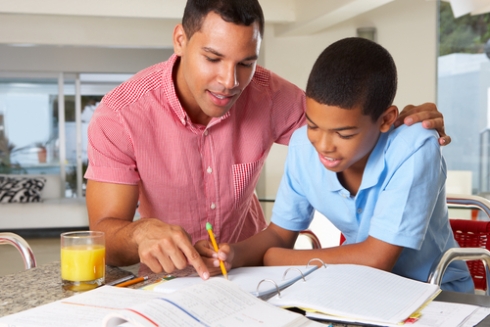A teacher’s take on how you can help your child succeed…
It's Parenting 101. Limiting TV time, making sure your child gets plenty of sleep and helping them set up a designated learning space. Yes, it’s common sense. But hey, it doesn’t hurt to be reminded.

It goes without saying that a school isn’t the only place learning occurs. You’ve previously heard my thoughts on why I’m not fond of homeworkand that I think kids should get more opportunities to play and just be kids, but alas, parents are always asking me what they can do, to help their child’s learning. It’s actually a question I love to hear as it demonstrates a parent’s understanding that learning is a partnership between home and school; child, family and teacher. Naturally, different children need extra help with different academic areas, but this list – based on Andrew Fuller's “Help Your Child Succeed At School” – outlines the basics.
- “Most Learning Doesn’t Happen At School!”
“Children spend only 15% of their time at school. They spend more time asleep (33%) than they do at school. Most of their time (52%) is at home, awake, mucking around, playing, and learning about life and it’s what they do with that time that is important.” Remember that you play a much great role in your child’s education than their teacher. - The Learning Space – Getting OrganisedWork with your child to create a dedicated space where they can do homework, projects and read. As you know from their bedroom, kids have trouble keeping things neat and tidy! They’ll need help with this initially, but you can help them figure out ways of keeping their stationary in order, the workspace clear and clutter free.
- The Learning Space – Lighting“Natural or indirect lighting such as a desk lamp is best for learning. It is best for your child not to study under fluorescent lighting as it is related to raised cortisol levels in the blood stream (an indicator of anxiety and agitation). Cortisol also suppresses language functions.”
- Limit TV/ Computer/ iPad Time, Of course!Don’t make them go cold turkey. An hour and a half per day is plenty. That’s not to say they should be doing ‘homework’ for the rest of the time: Arts, crafts, playing outside, listening to and making music, socialising, relaxing, family time, the list goes on. Oh, and keep electronics out of the bedroom and away from their ‘learning space’.
- Plenty Of Sleep!“A good nights sleep (at least 8 hours) is essential for optimal brain functioning at school. Memory consolidation occurs during sleep especially during dream (or REM) sleep. During the normal 8-9 hours of sleep, five dream (REM) cycles occur. Adolescents getting only 5-6 hours of sleep lose out on the last two REM cycles and thereby reduce the amount of time the brain has to consolidate information.Teenagers need as much sleep as children, partly because their brains are doing so much development. Always remember there is no such thing as a sleep bank. So just because you slept 10 hours one night doesn’t mean you can get away with only sleeping six hours the next night. Students who don’t get enough sleep have to work much harder to do well at school.”
Follow http://teachling.wordpress.com/ to read Handy Hints For Helping Children Learn At Home, Pt.2.
Download the full summary of Andrew Fuller’s version at http://www.andrewfuller.com.au/free/AndrewFullersHandyHints.pdf.
Image sourced from here.

No comments:
Post a Comment